It’s been a year now, since Oregon Gov. Kate Brown issued an executive order, shutting down the state and ordering Oregonians to stay home to slow the spread of the coronavirus.
We are still here: living, thriving and/or surviving the most life-altering global event in modern history.
OPB asked listeners and readers to reflect on life in a pandemic, to tell us what they’ve learned and how they’ve adapted. These interviews have been edited and condensed for clarity.

Jeremy Garber, 42, of Portland has found that a daily routine has helped with the disorientation of time during this pandemic.
David Stuckey / OPB
Jeremy Garber
One minute, one hour, one day, one week at a time
“My year has consisted mostly of routine and repetition: long, solitary walks (often with Bruce or Nina as musical companions), tons of reading, daily phone calls, indulging neglected hobbies, catching up with faraway friends, etc. Despite being fortunate to have had a job through most of the pandemic, it’s striking how disorienting (and frequently upsetting) the passage of time has become: the paradox of simultaneously feeling like these days are never-ending, while also perceiving them as nothing other than a fleeting, disquieting instant.”
Garber did make some surprising realizations: ”That I can wear the same (extraordinarily comfortable Revolution Hall) hoodie every single day and nobody will notice, realize or even care. Also, how accumulative moods and feelings can be, and how propulsive perspective and momentum often are (for better or worse).”
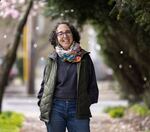
Mollie Hyman, 60, of Portland, says the small things and sounds in life have become much more apparent to her during the pandemic.
Kristyna Wentz-Graff / OPB
Mollie Hyman
Human being rather than a human doing
“I hear bird song so much more than I used to — small sounds like the tinkle of the water out of the faucet and sounds that I didn’t hear when my world was busier and louder. It has filled my life with lovely quiet music, and as my life gets louder and busier again, those sounds are still in the foreground, rather than the background. I’m much more grateful for all the small wonders of our life and I am feeling like a human being rather than a human doing.
“I’m vastly more comfortable spending my day in quiet activity or very little activity at all and not feeling like I need to fill it with people and activities and striving, and just sitting back and enjoying this immense marvelous world much more.”
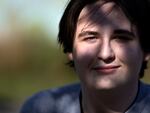
Van Warner, 17, of Portland says his pandemic year was one of the best and worst things that have ever happened in his short life, but that the time alone helped him discover a new appreciation for himself.
Kristyna Wentz-Graff / OPB
Van Warner
One of the best and worst things that’s ever happened
“There’s a lot of long days. Days where you sit with yourself and you think, what’s the use of sitting through this pandemic? It’s tiring. There’s a lot of dread of waking up the next day. I’m 17 years old. I’m right now at one of the most important times in my life. And here I am, doing nothing. I can’t distinguish between early January and March. I’m honestly horrified for my future.”
But Warner has seen an upside of this experience as well. “The pandemic for me, there’s been growth. Some days I enjoy that growth. Some days it’s kind of painful, trying to figure out how to be comfortable with myself. I was cut off with my peers for a long time and I didn’t have a lot of human interaction. I tried to talk to my parents more. Be more verbal about how I was feeling. Me and my family used to be pretty isolated from each other, but now we’re talking a lot. It’s nice.
“I discovered I’m not as bad as I thought I was. I learned to be pretty comfortable in my own skin. Most of my life I wasn’t very happy with myself. That happens with a lot of kids now. But just being alone, I learned to just try to be happier. There’s no point sitting and dwelling in the past — look to the future.”
Emily Fern
The pandemic has transformed me into a stronger activist and showed me the importance of fighting to dismantle inequality related to structural racism and ableism
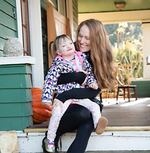
Emily Fern, 42, of Silverton, with her daughter, Juniper, says she became a stronger activist after witnessing inequality related to structural racism and ableism.
Courtesy of Emily Fern
“COVID-19 has opened up deep-seated wounds of injustice that are imperative to keep fighting against, to push our communities, society and the world to achieve a truly anti-racist and anti-ableist system for social transformation.
“As a parent to a child who is medically fragile, in ways we were more prepared for the social isolation and medical protocols and procedures as we had been practicing these for five years to keep our little one alive.
“What we weren’t prepared for was the lackadaisical reactions that followed — in the beginning, we were informed that COVID-19 would only kill the elderly and those with disabilities and medical conditions. I could almost feel a collective sigh of relief as if ‘they,’ ‘the others,’ didn’t really deserve life-saving mechanisms. And the NPR article showing that some individuals with intellectual disabilities who had COVID-19 were not allowed ventilation access proves the extreme injustices.
“It’s time for the world to embrace individuals who have disabilities as valid members of society, they deserve the same respect, love and care as everyone.”
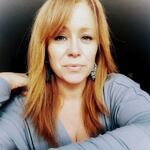
Heather Tramp, 45, of Klamath Falls, says the pandemic year was one of reflection and healing.
Courtesy of Heather Tramp
Heather Tramp
The year of reflection and healing
“In March 2020, I had lost 155 pounds in 12 months by changing my diet and exercising, but mostly by being honest with myself and addressing unhealthy behaviors.
“When the pandemic hit, I still had 100 pounds to lose. Prior to the pandemic, I had begun using the gym as my therapy and now the gym was closing. I had my routine set in stone to keep my healthy eating habits on track and now here I was working from home, alone, without the gym.
“I sat one evening mad, angry and worried about the shutdowns. I had an ‘aha moment’ where I realized I couldn’t control what was happening to me and the world…all I could control was how I reacted to it. I decided right then to make the most of a difficult situation. I found ways to work out and stay active. I found ways to cope with my emotions instead of eating them. I tackled some deep-seated emotions I had been bottling up. Mostly, I made a commitment to myself to continue my health journey.
“This pandemic year, I realized how important my health truly is (mentally, physically and spiritually). And as I watched my loved ones struggle with the pandemic, I found purpose. I found my voice and the confidence to share my story to maybe bring some light, hope and optimism to the people closest to me through my words and actions. I realized by healing myself and sharing my stories, I could help others.”

Cydnie Smith-McCarthy, 26, of Portland, followed a business opportunity that was born from the pandemic—opening her own juice and wellness space.
Kristyna Wentz-Graff / OPB
Cydnie Smith-McCarthy
This business happened out of nowhere
When the pandemic started, Smith-McCarthy says, “I was intending to rest. I thought, ‘we might be here for a while so I will just do my job and rest.’ I used to travel a lot so I couldn’t do that. I wondered, ‘what do I do with this time?’
“I was making videos at home about how to boost your immune system with juicing. I was using my home juicer, setting up my camera and posting onto Instagram. That turned into me juicing for people, my family and my friends.”
And in just a few months, she opened a new business, Drink Mamey. “I ordered bottles, made the labels. Got a friend to help me with the logo. And then it took off. It wasn’t really a plan to be in a store in three months — I started doing deliveries every weekend. Then I started putting my juices in Tea Bar so I wouldn’t have to do so much delivering, and then we looked at what was next.
By Oct 31, 2020, she opened her own storefront on NE Killingsworth.
“My takeaway was resiliency — anything can happen at any time. It doesn’t really matter what the state of the world is, you just keep going.”
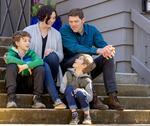
Liz and Jordan Delapoer, both 38, of Beaverton, with their children Grant, 9, left, and Logan, 6. The family has been together every day for the past year, and says they know that they've been lucky to have resources to deal with the pandemic.
Kristyna Wentz-Graff / OPB
Liz and Jordan Delapoer
We recognize that our situation is pretty lucky, but I’m not sure that any of us love it
Liz: “I’m an introvert. He’s an extrovert. He misses people and I would like space. So we’ve had to find ways to recognize when we need a change...when mom needs to go for a walk by herself. [I used to have] hours and hours alone to get work done. Logan just started kindergarten in fall of 2019 so this was our first year with both of them in public school. So I was getting lots of work done. I was doing projects around the house that were lingering for years. And now, everyone is at home, all the time.”
Jordan: “Life pre-COVID was pretty good too, so getting back to a version of that would be OK. I think part of the challenge, if you call it that, is the uncertainty. It’s hard to know what the next week or the next month will look like. Whether it’s health or political, it’s been a wild year for everyone. We’ve been really fortunate in the context of everything else that’s going on but it’s hard to know what the next month will look like or the next three months. It’s continued and continued. But now living in the uncertainty has gotten more, I don’t know if it’s comfortable but more familiar.”
Jefferson Greene
I haven’t even been able to mourn all these people that we’ve lost
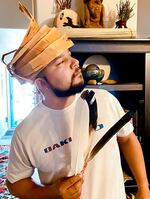
Jefferson Greene, 37, Warm Springs, says the pandemic made realize he wants to focus more of his time learning as much as he can from his elders.
Courtesy of Jefferson Greene
Greene operates the Columbia River Institute for Indigenous Development Foundation, which among many things, aims to acquire language and knowledge from speakers of the Ichishkín Language
“I’ve been working with the elderly generation since 2013, capturing history and having fellowship, making friends with elders who have our culture and history. Four of my elders passed to COVID, but I know twenty-some people who passed to COVID. Those who know how to harvest certain plants have passed away. Those that knew certain stories and histories have passed away.
“What I’m learning in life is not from a computer. It just isn’t. I decided I don’t do computer anymore. Anytime I do a Zoom call it’s on a cell phone. My emails are in the 2000s I think now. I tell everyone ‘you have to call me.’
“I’m on the frontlines. I do the interviews. I do the capturing. All the archiving and documenting. I also do the teaching. I just feel like those that have a passion to do admin and email, we hire those people to do that. But those that want to be a friendly face to the elders so they can share what they want to share, or just visit or gossip — just allow them to feel cared for.
“I also really appreciate being present for my children and my wife. I like to have lengthy conversations now. I like to sit with my thoughts. I like to take my kids to the park more often. Do more things outdoors with them.
“I just want us all to find that sensitive and humble part in ourselves to be sensitive to our fellow humans. We all have different histories and abilities, physically and mentally and spiritually. Some of us will see 60 years and some of us won’t.”
